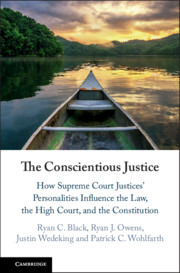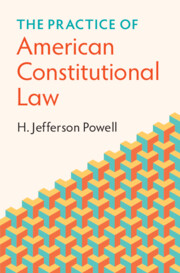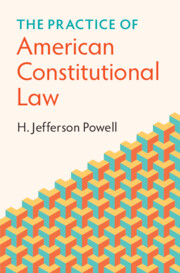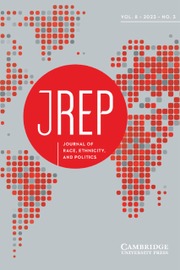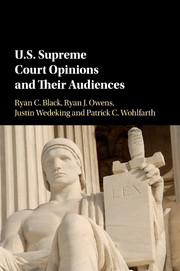The Conscientious Justice
United States Supreme Court justices make decisions that have a profound impact on American society. Empirical legal scholars have portrayed justices as either single-minded or strategic seekers of policy, and there is little room in these theories for things like law, reputation, or personality. This book offers a fresh perspective that will jar Supreme Court scholarship out of complacency. It argues that justices' personalities influence their behavior, which in turn influences legal development and the United States Constitution. This impressive group of authors exhaustively examine every part of the Court's decision-making process, and focus on the trait of conscientiousness and how it influences justices over nine different empirical contexts, from agenda setting to writing the Court's opinions. The Conscientious Justice is an important and comprehensive account of judging that restructures existing approaches to analyzing the High Court.
- Proposes a new view of judicial behavior
- Examines nearly every stage of the Court's decision-making process
- Provides replication data for all chapters and valid estimates of the justices' Big Five Personality Traits
Reviews & endorsements
‘The Conscientious Justice stands on its own as a piece of social science research that serves to advance our understanding of the judiciary and how personality can, and will, influence its behaviour.’ Paul R. Sawa, Canadian Law Library Review
‘This pathbreaking book should be read by anyone interested in the workings of the Supreme Court and its justices.’ M. W. Bowers, Choice
Product details
January 2020Hardback
9781107168718
350 pages
235 × 156 × 23 mm
0.63kg
75 b/w illus. 30 tables
Available
Table of Contents
- 1. Introduction
- 2. A theory about justices and conscientiousness
- 3. Measuring justices' conscientiousness
- 4. Conscientiousness and Supreme Court agenda setting
- 5. Conscientiousness and legal persuasion
- 6. Conscientiousness and the United States Solicitor General
- 7. Conscientiousness and majority opinion assignments
- 8. Conscientiousness and opinion bargaining
- 9. Conscientiousness and Supreme Court Opinion Content
- 10. Conscientiousness and the treatment of precedent
- 11. Conscientiousness and public opinion
- 12. Conscientiousness and recusal
- 13. Conclusion.

